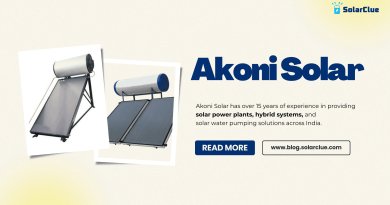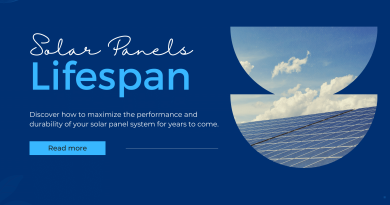How Do Solar Panels Lower Electricity Bills?
As electricity costs continue to rise, more homeowners are turning to solar panels as a way to reduce their electricity bills. Solar panels generate electricity from sunlight, which can be used to power your home, reducing the amount of electricity you need to purchase from the grid. This blog post will explain how solar panels lower electricity bills, discuss the concept of net metering, and explore how energy efficiency can maximize your savings. We’ll also look at the long-term benefits, government incentives, and common misconceptions about solar energy.
Table of Contents
- 1 How Solar Panels Generate Electricity and Reduce Grid Dependency
- 2 The Concept of Net Metering and Its Benefits
- 3 Calculating Potential Electricity Bill Savings
- 4 The Impact of Time-of-Use Electricity Rates on Solar Savings
- 5 Government Incentives and Rebates for Solar Power
- 6 Long-Term Cost Savings with Solar Panels
- 7 The Environmental Benefits of Reducing Energy Consumption
- 8 Common Misconceptions About Solar Energy and Energy Savings
- 9 The Future of Solar Power and Its Impact on Energy Consumption
- 10 Comparison of Solar Panel Savings Scenarios
- 11 Conclusion
- 12 FAQ Section
How Solar Panels Generate Electricity and Reduce Grid Dependency
The Basics of Solar Power Generation
- Photovoltaic Cells: Solar panels are made up of photovoltaic (PV) cells that convert sunlight into direct current (DC) electricity.
- Inverter Role: The inverter converts the DC electricity into alternating current (AC), which is the type of electricity used in homes.
- Grid-Tied Systems: Most residential solar systems are grid-tied, meaning they are connected to the local electricity grid. This allows homeowners to draw power from the grid when their solar panels aren’t producing enough electricity (e.g., at night).
Reducing Dependency on the Grid
- Daytime Energy Production: During daylight hours, your solar panels generate electricity, which you can use to power your home. This reduces the amount of electricity you need to buy from the grid.
- Offsetting Energy Use: On days when your panels generate more electricity than you need, the excess energy can be sent back to the grid.
The Concept of Net Metering and Its Benefits
What Is Net Metering?
- Net Metering Explained: Net metering is a billing arrangement that allows homeowners with solar panels to send excess electricity they generate back to the grid. In return, they receive credits on their electricity bill.
- How It Works: When your solar panels generate more electricity than your home uses, the surplus is exported to the grid, causing your electricity meter to run backward. When your panels aren’t producing enough electricity (e.g., at night), you can use the credits you’ve earned to offset the cost of the electricity you draw from the grid.
Benefits of Net Metering
- Lower Electricity Bills: Net metering reduces your overall electricity bill by allowing you to offset your energy consumption with the solar power you generate.
- Increased Savings: The more electricity your panels generate, the more you can reduce your reliance on the grid, resulting in greater savings.
Calculating Potential Electricity Bill Savings
Estimating Solar Savings
- System Size and Efficiency: The size and efficiency of your solar panel system are key factors in determining how much electricity you can generate and how much you can save.
- Electricity Consumption: Your typical household electricity usage will also determine how much you can save. Higher consumption can lead to greater savings when offset by solar power.
- Solar Potential: The amount of sunlight your location receives (solar irradiance) impacts your system’s electricity production and, consequently, your savings.
Example Calculation
- Monthly Consumption: If your household uses 900 kWh per month and your solar system generates 600 kWh per month, you’ll only need to purchase 300 kWh from the grid.
- Savings: If your utility charges ₹6 per kWh, your monthly savings would be ₹600 x 6 = ₹3,600.
The Impact of Time-of-Use Electricity Rates on Solar Savings
What Are Time-of-Use (TOU) Rates?
- TOU Rates Explained: Time-of-use rates are electricity pricing plans where the cost of electricity varies depending on the time of day. Rates are typically higher during peak demand hours (e.g., late afternoon and early evening) and lower during off-peak hours (e.g., late at night).
- Maximizing Solar Savings with TOU: By using solar power during peak hours and relying on grid electricity during off-peak hours, you can maximize your savings. Net metering also allows you to earn credits at the higher TOU rates if you export electricity during peak periods.
Example
- TOU Rates: Assume peak rates are ₹10/kWh and off-peak rates are ₹4/kWh.
- Usage and Savings: If you generate 200 kWh during peak hours and 100 kWh during off-peak hours, you could save significantly by reducing your grid consumption during the most expensive times.
Government Incentives and Rebates for Solar Power
Available Incentives
- Federal and State Incentives: In many countries, governments offer incentives such as tax credits, grants, and rebates to encourage solar adoption.
- Subsidies: In India, for example, the Ministry of New and Renewable Energy (MNRE) offers subsidies on solar panel installations, reducing the upfront cost for homeowners.
How Incentives Increase Savings
- Lower Initial Costs: These incentives can significantly reduce the cost of installing solar panels, leading to a faster return on investment (ROI).
- Long-Term Benefits: By lowering your initial investment, you can achieve net savings more quickly and enjoy lower electricity bills for years to come.
Long-Term Cost Savings with Solar Panels
Payback Period
- What Is the Payback Period?: The payback period is the time it takes for the savings generated by your solar panels to equal the initial cost of the system.
- Typical Payback: Depending on your location, electricity rates, and available incentives, the payback period for solar panels can range from 5 to 10 years.
Lifetime Savings
- Extended Benefits: After the payback period, your solar panels will continue to generate savings for the remainder of their lifespan, which is typically 25 to 30 years.
- Total Savings: Over the life of the system, homeowners can save hundreds of thousands of rupees, depending on their electricity consumption and local rates.
The Environmental Benefits of Reducing Energy Consumption
Lowering Carbon Footprint
- Clean Energy Source: Solar panels generate electricity without emitting greenhouse gases, reducing your household’s carbon footprint.
- Offsetting Emissions: By reducing your reliance on fossil fuels, you contribute to the reduction of overall carbon emissions.
Promoting Sustainability
- Sustainable Living: Reducing energy consumption through solar power helps promote a more sustainable lifestyle and lessens the demand for non-renewable energy sources.
- Protecting the Environment: By decreasing the need for power from coal or gas plants, you help reduce pollution and environmental degradation.
Common Misconceptions About Solar Energy and Energy Savings
Misconception 1: Solar Panels Don’t Work on Cloudy Days
- Reality: Solar panels do work on cloudy days, although they generate less electricity compared to sunny days. However, they still produce enough energy to reduce your reliance on the grid.
Misconception 2: Solar Panels Are Too Expensive
- Reality: While the upfront cost of solar panels can be high, government incentives, rebates, and long-term energy savings make them a cost-effective investment.
Misconception 3: Solar Panels Require Constant Maintenance
- Reality: Solar panels are low-maintenance. Occasional cleaning and regular inspections are usually sufficient to keep them operating efficiently.
The Future of Solar Power and Its Impact on Energy Consumption
Technological Advancements
- Increased Efficiency: As solar technology continues to advance, solar panels are becoming more efficient, generating more electricity from the same amount of sunlight.
- Energy Storage: The development of affordable energy storage solutions, such as batteries, will allow homeowners to store excess solar energy for use during non-sunny periods, further reducing grid dependency.
Growing Adoption
- Expanding Market: With the decreasing cost of solar panels and growing awareness of environmental issues, more homeowners are expected to adopt solar power, leading to widespread reductions in energy consumption and lower electricity bills.
Comparison of Solar Panel Savings Scenarios
| Scenario | Without Solar Panels | With Solar Panels (Net Metering) | With Solar Panels (TOU Rates) |
|---|---|---|---|
| Monthly Electricity Usage (kWh) | 900 | 300 | 200 (peak) / 100 (off-peak) |
| Electricity Cost (₹/kWh) | ₹6 | ₹6 (net metering credit) | ₹10 (peak) / ₹4 (off-peak) |
| Monthly Electricity Bill (₹) | ₹5,400 | ₹1,800 | ₹2,000 |
| Estimated Monthly Savings (₹) | ₹0 | ₹3,600 | ₹3,400 |
Conclusion
Solar panels are a powerful tool for reducing electricity bills, providing long-term savings, and promoting a sustainable lifestyle. By generating your own electricity, taking advantage of net metering, and understanding the impact of time-of-use rates, you can significantly lower your energy costs. Additionally, government incentives and the environmental benefits of solar power make it a wise investment for homeowners looking to reduce their carbon footprint and achieve energy independence. As solar technology continues to evolve, the future holds even greater potential for savings and environmental impact
FAQ Section
1. How do solar panels help reduce electricity bills?
Solar panels generate electricity from sunlight, which you can use to power your home. This reduces the amount of electricity you need to buy from the grid, lowering your electricity bills.
2. What is net metering and how does it benefit me?
Net metering is a billing system that credits solar panel owners for the excess electricity they generate and send back to the grid. These credits can be used to offset the cost of electricity you consume when your panels aren’t producing enough power.
3. How much can I save with solar panels?
The amount you save depends on factors such as your electricity usage, the size and efficiency of your solar panel system, local electricity rates, and available government incentives. On average, homeowners can save between 50% to 90% on their electricity bills.
4. Do solar panels work during cloudy days?
Yes, solar panels still generate electricity on cloudy days, though at a reduced efficiency. They continue to lower your reliance on the grid and help reduce your electricity bills.
5. Are there any government incentives for installing solar panels?
Yes, many governments offer incentives such as tax credits, rebates, and subsidies to reduce the upfront cost of solar panel installation, making it more affordable and increasing your overall savings.


